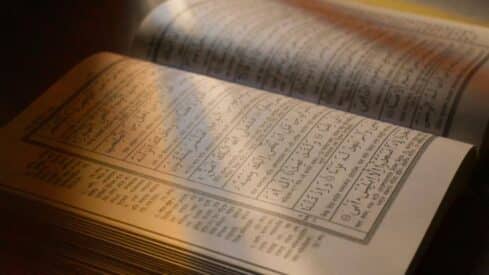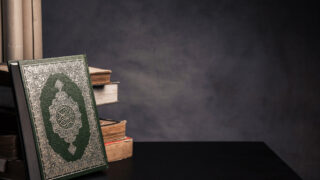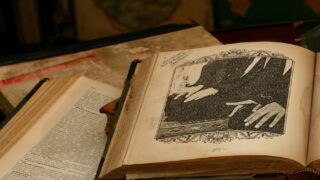Muslims believe that the Qur’an in its entirety is the words of Allah revealed to Prophet Muhammad (peace and blessings be upon him) over a long period of time and that the Qur’an is protected from any form of corruption and alteration.
There are many proofs that the Qur’an is Allah’s revelation. Here I will summarize the most important evidence. First, Prophet Muhammad distinguished clearly and sharply between his own words and the words of Allah. At no time did he ascribe the Qur’an to himself, although it would have been an honor to be able to claim the authorship of such a unique book.
Second, the Prophet was keen to write down the text of the Qur’an immediately after he received it from Allah. To ensure the distinction between his own words and the word of Allah, he warned people not to write down his own prophetic utterances so that they would not become mixed with Allah’s words. Muhammad even commanded people to erase anything they had written of his own sayings that was not part of the Qur’an.
Third, when the Qur’an was revealed to him from Allah, it was accompanied by psychological and physical changes in himself: his face flushed and his body trembled and sweated. This was observed by those present. But, in contrast, when he spoke of his own accord, no such things occurred. If he were an ordinary author, there would not have been this contrast in the effect on his mind and body according to what he was writing. A man could change from writing prose to writing poetry without such visible effects. And if we look back at the Prophet’s life before he was given the revelation, he did not experience any such changes.
In this context, I would like to say that some who are interested in analyzing these changes in the Prophet diagnosed him as an epileptic. They forgot that the Prophet was fully aware of what he was saying and could recall the whole experience afterwards. We do not need to dwell on their theory, since it is now wholly discounted.
Fourth, Allah’s speech is distinctive and does not resemble Muhammad’s own words if we compare the two. Even when Muhammad’s words reach the zenith of human rhetoric, they do not compare with the words of the Qur’an. The Qur’an compared to them is like the sun compared to the stars.
Fifth, the Qur’an is miraculous, unlike Muhammad’s own sayings. All people, even demons, were challenged to produce anything equal to the Qur’an[1] but nobody was challenged to equal Muhammad’s hadith.
From the very beginning, Muslims were fully aware of the distinction between Allah’s words and Muhammad’s words. They introduce Allah’s words with, “Allah says…” and Muhammad’s hadiths with, “The Prophet says…”
Sixth, Muslims distinguish between the words of Allah and the words of the Prophet when they read them aloud. They use a different tone for the words of Allah.
The Prophet described some of his companions as “sweet- voiced” when they read the Qur’an, and he himself often asked them to read to him. Once he was passing by Abu Musa Al-Ash`ari’s house and heard him reading the Qur’an. He stopped to listen. The Prophet was attracted by his voice. During morning Prayer when they met, the Prophet told him he had listened to his recitation the previous night. The man said, “If I had known that you were listening I could have read even more beautifully for you.”[2] The man’s voice was naturally sweet.
Once, the Prophet asked Ibn Mas`ud to read the Qur’an for him. The latter said to the Prophet, “Should I read it to you when it was revealed to you?” The Prophet replied, “I love to hear it from the lips of others.”
Ibn Mas`ud read Surat An-Nisaa’ for the Prophet. When he read the following verse meaning “How then shall it be, when We bring forward from every nation a witness, and bring thee (O Muhammad) to witness against those?” (An-Nisaa’: 41), the Prophet asked him to stop, saying, “That is enough.” Then the reciter looked at the Prophet’s face and saw that his eyes were full of tears.[3]
This clearly demonstrates not only the distinction between the Qur’an and the hadith of the Prophet, but also the exact way that Muslims learned the Qur’an
By: Dr. Muhammad Abu Laylah


















